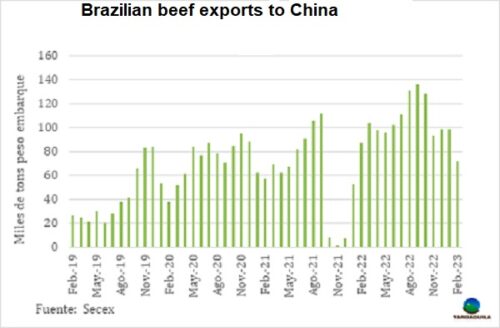6 April 2023
Brazil is trying to get as much benefit as possible from the visit that the government and businessmen made last week in Beijing, beyond the setback that President Lula was finally unable to travel due to pneumonia. Among the main issues on the agenda are some related to meat exports.

Brazil proposed a list of 50 meat processing plants for Beijing to enable them to export to China. They are processors of beef, pork and poultry, but about half of them slaughter cattle and 12 of them are from the three main companies, JBS, Marfrig and Minerva. Today, Brazil has some thirty plants authorized to export beef to China, so raising the list to more than 50 will imply an export potential to the main destination.
The last time a massive authorization of Brazilian processing plants was proposed to China was in the second half of 2019, when China was facing the tremendous supply crisis of animal protein derived from the African swine fever epidemic. Necessity has the face of a heretic and at that time China allowed the entry of everything it could to compensate for the lack of pork.
Until then, Brazil exported between 20,000-30,000 tons of beef per month to China, a volume that quickly shot up to around 80,000 tons and reached historical peaks of 130,000 tons in the middle of last year. If a new massive authorization of Brazilian plants is confirmed, the growth will not be of similar proportions, but it could imply an additional 25,000-30,000 tons per month.
In addition, they are analyzing the possibility of doing without the dollar in commercial operations between the two countries. Something that, without a doubt, is going to fall very badly in the United States, since it would go against the hegemony of the US dollar in the international market.
The possibility of reviewing the sanitary protocol and discriminating between atypical mad cow cases and the classic ones is surely also in the conversations between the Brazilians and the Chinese. It is disproportionate that atypical cases determine the suspension of exports, since they do not imply any health risk and generate enormous volatility in the market.
We bring leather, material and fashion businesses together: an opportunity to meet and greet face to face. We bring them from all parts of the world so that they can find fresh partners, discover new customers or suppliers and keep ahead of industry developments.
We organise a number of trade exhibitions which focus on fashion and lifestyle: sectors that are constantly in flux, so visitors and exhibitors alike need to be constantly aware both of the changes around them and those forecast for coming seasons.